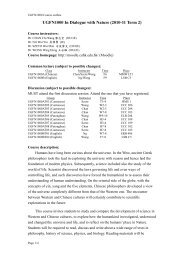ä¸è¼å ¨æ¸ - The Chinese University of Hong Kong
ä¸è¼å ¨æ¸ - The Chinese University of Hong Kong
ä¸è¼å ¨æ¸ - The Chinese University of Hong Kong
You also want an ePaper? Increase the reach of your titles
YUMPU automatically turns print PDFs into web optimized ePapers that Google loves.
Susan Gano-Phillips, Affective Learning in General Education 37<br />
<strong>of</strong> affective learning outcomes. <strong>The</strong> only question now is whether faculty will<br />
choose to step up to the challenge <strong>of</strong> life-long learning and educate ourselves,<br />
alongside our students, or whether we will choose to pr<strong>of</strong>ess something that<br />
we, ourselves, are sometimes unwilling to do.<br />
* * * * * * * * * * * * * * *<br />
Appendix I. Krathwohl, Bloom, and Masia’s Taxonomy <strong>of</strong><br />
the Affective Domain (1964) <br />
Level and Definition<br />
Receiving refers to the student’s willingness<br />
to attend to particular phenomena <strong>of</strong> stimuli<br />
(classroom activities, textbook, music, etc.).<br />
Learning outcomes in this area range from the<br />
simple awareness that a thing exists to selective<br />
attention on the part <strong>of</strong> the learner. Receiving<br />
represents the lowest level <strong>of</strong> learning outcomes<br />
in the affective domain.<br />
Responding refers to active participation on<br />
the part <strong>of</strong> the student. At this level he or she<br />
not only attends to a particular phenomenon but<br />
also reacts to it in some way. Learning outcomes<br />
in this area may emphasize acquiescence<br />
in responding (reads assigned material),<br />
willingness to respond (voluntarily reads beyond<br />
assignment), or satisfaction in responding<br />
(reads for pleasure or enjoyment). <strong>The</strong> higher<br />
levels <strong>of</strong> this category include those instructional<br />
objectives that are commonly classified under<br />
“interest”; that is, those that stress the seeking<br />
out and enjoyment <strong>of</strong> particular activities.<br />
Illustrative Verb<br />
asks, chooses,<br />
describes, follows,<br />
gives, holds,<br />
identifies,<br />
locates, names,<br />
points to, selects, sits<br />
erect, replies, uses<br />
answers, assists,<br />
complies, conforms,<br />
discusses, greets,<br />
helps, labels,<br />
performs, practices,<br />
presents, reads,<br />
recites, reports,<br />
selects, tells, writes<br />
<br />
Downloaded from http://assessment.uconn.edu/docs/LearningTaxonomy_Affective.pdf.

















